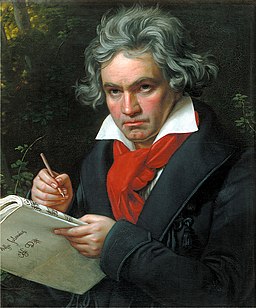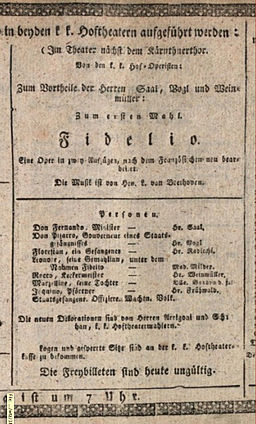 German composer and pianist Ludwig van Beethoven was baptized on December 17, 1770, so it is likely he was born a few days prior to that date. As one of the most recognized composers in music history, his works are still some of the most frequently performed classical pieces to this day. Beethoven’s work spans the transition from the classical period into the romantic era.
German composer and pianist Ludwig van Beethoven was baptized on December 17, 1770, so it is likely he was born a few days prior to that date. As one of the most recognized composers in music history, his works are still some of the most frequently performed classical pieces to this day. Beethoven’s work spans the transition from the classical period into the romantic era.
“No composer left a mark on music quite like Ludwig van Beethoven. He took the popular forms of his time — symphony, string quartet, piano sonata, opera — and stretched them to their breaking points. He embodied the then-new ideal of the musician as passionate, politically engaged Romantic hero.”
Beethoven was born in Bonn, but moved to Vienna in young adulthood to study with Haydn. He spent some 35 years in Vienna, and yet a visit to Vienna, noted Michael Cooper, bombards the traveler with “the city’s Mozart-industrial complex.” Mozart spent his last decade in Vienna, a much shorter period of time than Beethoven. Both men were key influencers of their time. Cooper’s travel back to Beethoven’s roots yields some interesting observations.
Beethoven was almost completely deaf by 1814, but continued to compose masterpiece after masterpiece. It seems that he put every ounce of his being through his work. When Beethoven died March 26, 1827, apparently he gave more. Visitors cut locks of his hair for keepsakes. There are still strands of his hair available for auction to this day.
Learn more about Ludwig van Beethoven
- From Wikipedia: https://en.wikipedia.org/wiki/Ludwig_van_Beethoven
- From The New York Times: Beethoven’s 250th Birthday: Here’s Everything You Need To Know
- From Britannica.com: https://www.britannica.com/biography/Ludwig-van-Beethoven
From our collection
Fidelio

- Abscheulicher… Komm, Hoffnung, lass den letzten Stern
- Gott! welch’ Dunkel hier!… In des Lebens Frühlingstagen
- Ha! Welch’ ein Augenblick!
- Hat man nicht auch Gold beineben
- O namenlose Freude!
- O wär’ ich schon mit dir vereint
Listen to Fidelio, conducted January 29, 1978 by Leonard Bernstein.
Orchestra – Wiener Philharmoniker
Chorus – Wiener Staatsoper
Leonore – Gundula Janowitz
Florestan – René Kollo
Pizarro – Hans Sotin
Rocco – Manfred Jungwirth
Marzelline – Lucia Popp
Jaquino – Adolf Dallapozza
Fernando – Hans Helm
Erster Gefangene – Karl Terkal
Zweiter Gefangene – Alfred Sramek
Christus am Ölberge
Listen to Jodie Devos perform Preist des Erlösers Güte, written by Franz Xaver Huber and set by Ludwig van Beethoven
9th Symphony
Autograph score of Beethoven’s Ninth Symphony (1822). https://t.co/3fPeFThdLZ pic.twitter.com/KEI2TuDkBZ
— Douglas Ipson (@DougIpson) December 17, 2020
Our entire collection of texts, both opera arias and art songs as set by Ludwig van Beethoven may be found here:
https://www.ipasource.com/composer/b/beethoven-ludwig-van-1770-1827.html
And finally, just for fun, a very modern take from the iPad Orchestra on Beethoven’s 5th:
